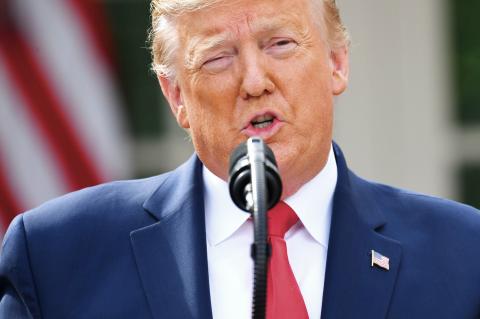The US House of Representatives early yesterday approved legislation to provide direct relief to Americans suffering physically, financially and emotionally from the COVID-19 pandemic.
US President Donald Trump on Friday declared the outbreak a national emergency, freeing up money and resources to fight it, then threw his support behind the congressional aid package.
From the Rose Garden at the White House, Trump said: “I am officially declaring a national emergency,” unleashing as much as US$50 billion for state and local governments to respond to the pandemic.

Photo: AFP
Trump also announced a range of executive actions, including a new public-private partnership to expand coronavirus testing capabilities with drive-through locations, as Washington tries to subdue the virus, whose spread is roiling markets, shuttering institutions and disrupting the lives of everyday Americans.
However, Trump denied any responsibility for delays in making testing available, as his administration has come under criticism for being too slow to respond.
“I don’t take responsibility at all” for the slow launch of testing, Trump said.
As the House prepared to vote late on Friday, US House of Representatives Speaker Nancy Pelosi touted the hard-fought package that would provide free testing, sick pay for workers, enhanced unemployment benefits and bolstered food programs.
“We did what we said we were going to do: Put families first,” said Pelosi, flanked by US Democratic lawmakers, including many first-year legislators.
The House passed the bill after midnight on a bipartisan vote, 363-40. The bill now goes to the US Senate.
Trump’s tweet of approval instilled fresh energy in the package, all but ensuring that wary US Republicans would join with a robust vote.
The crush of late-day activity capped a tumultuous week in Washington as the fast-moving virus left ordinary Americans suddenly navigating self-quarantines, school closures and a changed way of life.
The White House was under enormous pressure, dealing with the crisis on multiple fronts as it encroached ever closer on the president.
Trump has been known to flout public health advice — and was eagerly shaking hands during the more than hour-long afternoon event — but acknowledged that he “most likely” would be tested soon after exposure to individuals who have tested positive for the virus.
The White House physician later indicated that Trump’s interactions were low-risk and that testing was not necessary.
Still, Trump said that officials do not want people taking the test unless they have certain symptoms.
“We don’t want people without symptoms to go and do that test,” Trump said. “It’s totally unnecessary.”
Trump also took a number of other actions to bolster energy markets, ease the financial burden for Americans with student loans and give medical professionals additional “flexibility” in treating patients during the public health crisis.
“Through a very collective action and shared sacrifice, national determination, we will overcome the threat of the virus,” Trump said.
Central to the aid package from the US Congress, which builds on an emergency US$8.3 billion measure approved last week, are the free testing, sick pay and family leave provisions.

The CIA has a message for Chinese government officials worried about their place in Chinese President Xi Jinping’s (習近平) government: Come work with us. The agency released two Mandarin-language videos on social media on Thursday inviting disgruntled officials to contact the CIA. The recruitment videos posted on YouTube and X racked up more than 5 million views combined in their first day. The outreach comes as CIA Director John Ratcliffe has vowed to boost the agency’s use of intelligence from human sources and its focus on China, which has recently targeted US officials with its own espionage operations. The videos are “aimed at

STEADFAST FRIEND: The bills encourage increased Taiwan-US engagement and address China’s distortion of UN Resolution 2758 to isolate Taiwan internationally The Presidential Office yesterday thanked the US House of Representatives for unanimously passing two Taiwan-related bills highlighting its solid support for Taiwan’s democracy and global participation, and for deepening bilateral relations. One of the bills, the Taiwan Assurance Implementation Act, requires the US Department of State to periodically review its guidelines for engagement with Taiwan, and report to the US Congress on the guidelines and plans to lift self-imposed limitations on US-Taiwan engagement. The other bill is the Taiwan International Solidarity Act, which clarifies that UN Resolution 2758 does not address the issue of the representation of Taiwan or its people in

US Indo-Pacific Commander Admiral Samuel Paparo on Friday expressed concern over the rate at which China is diversifying its military exercises, the Financial Times (FT) reported on Saturday. “The rates of change on the depth and breadth of their exercises is the one non-linear effect that I’ve seen in the last year that wakes me up at night or keeps me up at night,” Paparo was quoted by FT as saying while attending the annual Sedona Forum at the McCain Institute in Arizona. Paparo also expressed concern over the speed with which China was expanding its military. While the US

SHIFT: Taiwan’s better-than-expected first-quarter GDP and signs of weakness in the US have driven global capital back to emerging markets, the central bank head said The central bank yesterday blamed market speculation for the steep rise in the local currency, and urged exporters and financial institutions to stay calm and stop panic sell-offs to avoid hurting their own profitability. The nation’s top monetary policymaker said that it would step in, if necessary, to maintain order and stability in the foreign exchange market. The remarks came as the NT dollar yesterday closed up NT$0.919 to NT$30.145 against the US dollar in Taipei trading, after rising as high as NT$29.59 in intraday trading. The local currency has surged 5.85 percent against the greenback over the past two sessions, central